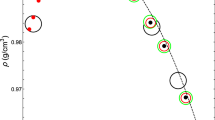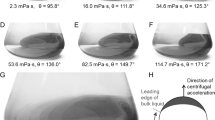Abstract
WATER at 20° C. is now widely used as the primary standard for viscosity measurement1, the viscosity being taken to be 0.01002 poise as obtained by Swindells, Coe and Godfrey2, and confirmed by Roscoe and Bainbridge3. The International Organization for Standardization has recently proposed the international adoption of this value, but the question has arisen whether the viscosity depends significantly on the presence of dissolved air in the water4. We have now made some very accurate measurements to determine the effect of dissolved air, and found it to be insignificant for present standards requirements.
This is a preview of subscription content, access via your institution
Access options
Subscribe to this journal
Receive 51 print issues and online access
$199.00 per year
only $3.90 per issue
Buy this article
- Purchase on Springer Link
- Instant access to full article PDF
Prices may be subject to local taxes which are calculated during checkout
Similar content being viewed by others
References
U.S. Nat. Bur. Stand., Tech. News Bull., 37, 100 (1953).
Swindells, J. F., Coe, J. R., and Godfrey, T. B., J. Res. Nat. Bur. Stand., 48, 1 (1952).
Roscoe, R., and Bainbridge, W., Proc. Phys. Soc., 72, 585 (1958).
U.S. Nat. Bur. Stand., Ann. Rep. for 1959, 31, Misc. Pub. No. 229.
Author information
Authors and Affiliations
Rights and permissions
About this article
Cite this article
CAW, W., WYLIE, R. Effect of Dissolved Air on the Viscosity of Water. Nature 189, 995–996 (1961). https://doi.org/10.1038/189995b0
Issue Date:
DOI: https://doi.org/10.1038/189995b0
Comments
By submitting a comment you agree to abide by our Terms and Community Guidelines. If you find something abusive or that does not comply with our terms or guidelines please flag it as inappropriate.



